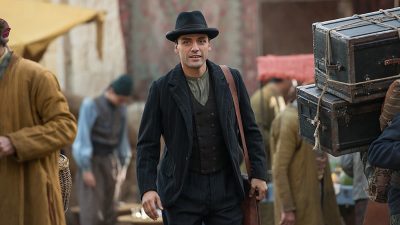
Dear Terry George fans, don’t get your hopes up too soon. The acclaimed “Hotel Rwanda” director’s attempt at portraying the Armenian Genocide in his new epic, “The Promise,” starring Oscar Isaac, Charlotte Le Bon and Christian Bale, is every bit as historically accurate as his previous films but doesn’t do the horror of the events the same amount of justice. “The Promise,” while a beautifully shot and incredibly accurate account of one of the most brutal episodes in history, falls flat when it comes to acting and character construction, leaving the viewer saddened by violence, but not moved to the tears it is clearly meant to evoke.
The story centers around a love triangle between Armenian medical student Mikael (Isaac), Parisian-raised but Armenian-born tutor Ana (Le Bon) and American journalist Chris (Bale), who is covering World War I for the Associated Press. The three meet in Constantinople, Turkey, where Mikael is attending university, having left behind his family and fiancé in his small rural hometown. Ana is working as a tutor for Mikael’s young cousins while dating Chris. Set against the backdrop of the tumultuous political atmosphere of Turkey in the early 1900s, the film shines in its opulent and rich scenes of Turkish life.
The cinematography is especially powerful in the slow, meandering pans over Turkey’s coastline and the attention to period-specificity in the setting and costuming creates a lush, immersive experience that puts the viewer right into Mikael’s shoes. At times, the vibrant colors and minuscule detailing is so powerful that it seems as if one can almost smell the spices in the marketplace, the cigars in the club, the gunpowder streaking by as Turkish-Armenian conflicts come to a head and the Armenian Genocide begins, quietly at first, then all at once.
This is, actually, exactly how the two-hour-plus long movie works: the first three-quarters of the movie feel pointless once we arrive at the action-packed scenes at the end. The film is based on the true story of the resistance at Musa Dagh, in which a small group of Armenians living near the titular mountain beat off Turkish soldiers long enough to be rescued by the French Navy. The last half-hour or so of the film is mainly based on this event, which could have easily been the film’s climax. Instead, the visceral horror felt at the portrayal of Mikael’s experience in a forced labor camp, his escape to isolation with his now-wife, and subsequent reunion with Chris and Ana during a mission to evacuate a soon-to-be-destroyed orphan refuge is wasted, as the frankly torturously boring first hour of the film swallows these powerful scenes into its meaningless and soon forgotten exposition.
Also extremely disappointingly, the acting is often evocative of a cheesy soap opera, especially in the more intimate moments between Mikael and Ana. Their sex scenes are exactly the type that you’d never want to watch with your parents, not because of overt passion, but because the lack of it is almost unbearably awkward. Isaac and Le Bon lack the chemistry the film so desperately needs to keep the heavily forced love triangle between Mikael, Ana and Chris even vaguely interesting. Their unbelievably and unrealistically portrayed struggle to find true love is trivial against the deeply disturbing backdrop of a holocaust; the film could have easily done without the strung out, pre-packaged Hollywood love triangle trope and focused more fully on the devastation of the Armenian Genocide and developing the characters as individual people.
In fact, this is where the film falls short. Time and time again, it gives the audience little to no motivation to care about the characters independently, as their personalities and character growth are stunted by clunky dialogue and predictable action. We are horrified when Mikael’s family is murdered, because genocide is brutal, and because no one wants to think about their mother or father dying of old age, much less ethnic cleansing. Even the revelation that his unborn child had been ripped from his wife’s uterus before her death is only moving because violence is moving. The lackluster relationship between Mikael and his wife hinders the viewer’s emotional response to their tragedy.
In short, “The Promise” fails because it expects us to feel deeply about the characters based on their relationships, not who they are as people. We care because of our innate instinct to feel empathy when others are brutalized, not because we are invested in the lives of the characters on the screen.
Yet despite the film’s inability to connect the characters with the audience and the unnecessary inclusion of a pointless and trite love triangle, which too often overwhelms the storyline, it truly does shine as an accurate and compassionately portrayed testament to the Armenian people who died tragically during the genocide, and to the resilience and strength of the survivors.
“The Promise” is, at its core, an epic story of survival, faith and love in the face of adversary: for others, for your homeland, for freedom and for justice. With its dedication to historical accuracy and strikingly beautiful cinematography, “The Promise” is sure to leave viewers satisfied — as long as they can stay awake through the first hour.
“The Promise” opens nationwide today.
















































































































